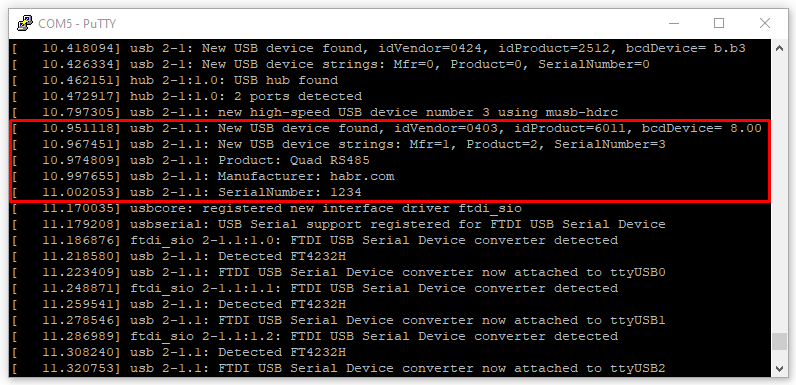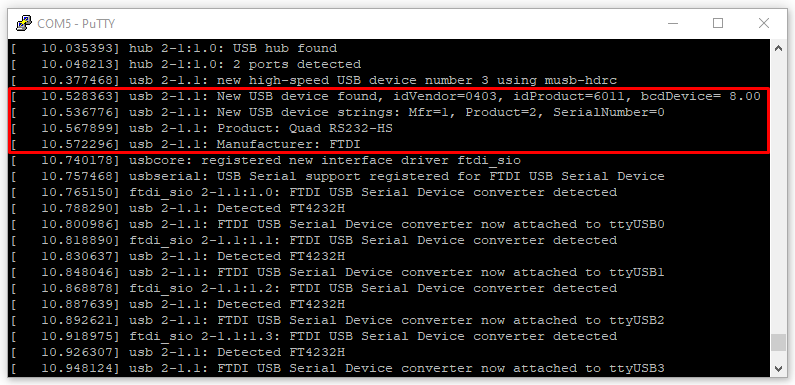
The FT4232H is a USB to UART converter IC that supports High Speed mode on the USB side and has four ports on the UART side.
By connecting an EEPROM memory to this microcircuit, you can set specific operating modes or change the manufacturer's data.
Let's take an example and configure the FT4232H directly on a system running GNU / Linux. We will do this using the utility ftdi_eeprom
.
Installation ftdi_eeprom
ftdi_eeprom
open-source libFTDI
libconfuse
.
ftdi_eeprom
Ubuntu Debian, :
sudo apt-get update sudo apt-get install ftdi-eeprom
Yocto Project (thud)
,ftdi_eeprom
, :
recipes-support/confuse/confuse_2.7.bb
DESCRIPTION = "Library for parsing configuration files." HOMEPAGE = "http://www.nongnu.org/confuse/" SECTION = "libs" LICENSE = "ISC" LIC_FILES_CHKSUM = "file://NEWS;md5=18e885b42b86362019e0cab8dc2a393b" SRC_URI = "http://download.savannah.gnu.org/releases/confuse/confuse-${PV}.tar.gz" SRC_URI[md5sum] = "45932fdeeccbb9ef4228f1c1a25e9c8f" SRC_URI[sha256sum] = "e32574fd837e950778dac7ade40787dd2259ef8e28acd6ede6847ca895c88778" inherit autotools binconfig pkgconfig lib_package gettext EXTRA_OECONF = "--enable-shared" BBCLASSEXTEND = "native"
recipes-support/libftdi/libftdi_%.bbappend
PACKAGECONFIG += "ftdi-eeprom" PACKAGECONFIG[ftdi-eeprom] = "-DFTDI_EEPROM=on,-DFTDI_EEPROM=off,confuse" PACKAGES =+ "ftdi-eeprom" FILES_ftdi-eeprom += "${bindir}/ftdi_eeprom"
FT4232H
UART- FT4232H RS232
, – «FTDI»
– «Quad RS232-HS»
.

«habr.com»
, «Quad RS485»
, UART- RS485
.
habr.conf
# , EEPROM, filename=habr.bin # . FT4232H : 0x0403 vendor_id=0x0403 # . FT4232H : 0x6011 product_id=0x6011 # EEPROM . 0x46 93xx46, 0x56 93xx56 0x66 93xx66 eeprom_type=0x56 manufacturer="habr.com" product="Quad RS485" serial="1234" # use_serial=true # : ( ) * 2 . # 0, self_powered=true max_power=0 # USB, self_powered=true # RI 0 true, USB # 20 . remote_wakeup=false # cha_type=UART chb_type=UART # com- cha_vcp=true chb_vcp=true chc_vcp=true chd_vcp=true # RS-485 cha_rs485=true chb_rs485=true chc_rs485=true chd_rs485=true
ftdi_eeprom
eeprom-, :
ftdi_eeprom --flash-eeprom habr.conf
After restarting the device, you can observe the results of the work:
